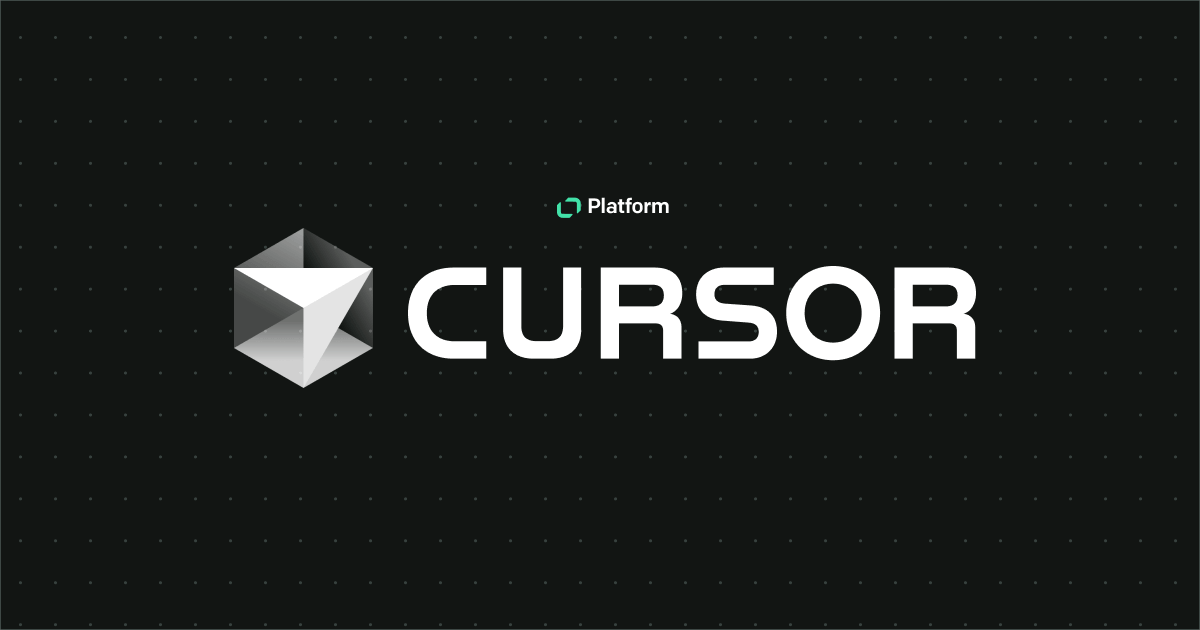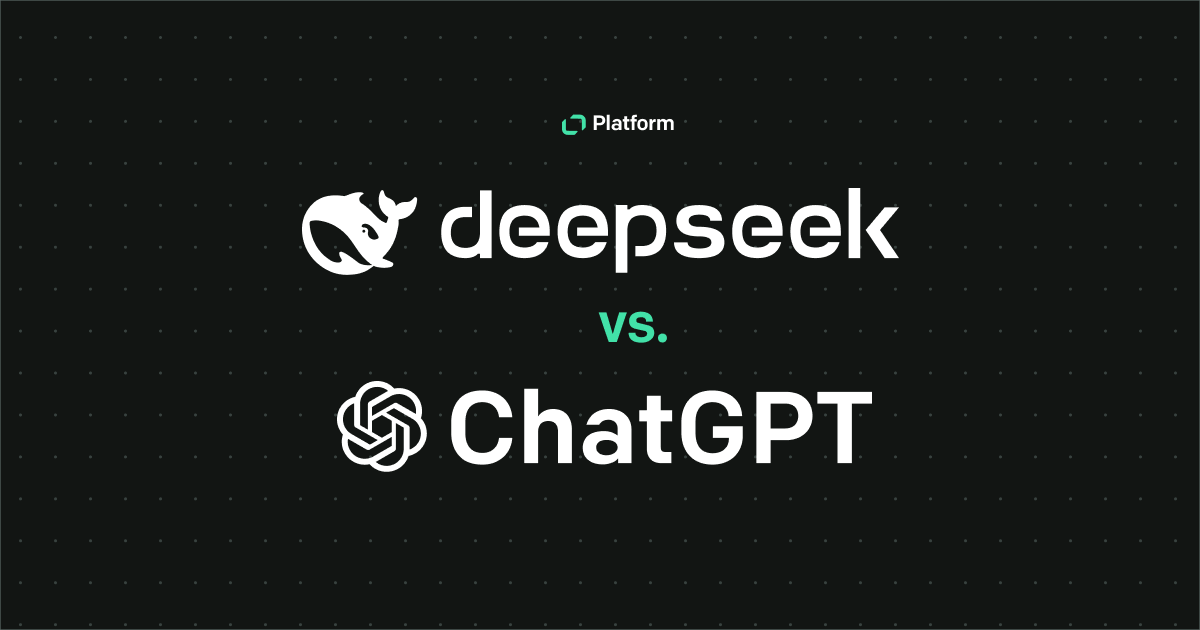With so many programming languages available, beginners often feel overwhelmed before they even start learning their first language. But it doesn’t have to be complicated.
Picking the right language requires a solid understanding of what you want to achieve, current demand, the learning curve, and the language's long-term outlook. Then, you just need to find a basic programming language that fits your individual needs.
Factors for choosing what programming language to learn
Before we can recommend a language for you to learn, you need to know what you want to get out of learning a programming language overall. Then, you can start to assess the quality of a language based on a few critical factors.
Universities traditionally teach programming under the umbrella of computer science, which often ties into mathematics and electrical engineering.
Your goals and interests
Before diving into any specific language, take a moment to reflect on your objectives. Are you looking to build websites, develop mobile apps, analyze data, or create video games? Different languages excel in various domains, so clarifying your interests will help narrow down your options.
For instance, if web development piques your interest, languages like JavaScript, HTML, and CSS would be excellent starting points. On the other hand, if you're fascinated by data analysis and machine learning, Python might be your best bet.
Job market demand
While passion is crucial, it's also wise to consider the job market. Some languages are in higher demand than others, potentially offering more career opportunities and better compensation. But if it's a popular language, there's going to be career opportunities for it.
As of 2024, languages like Python, JavaScript, and Java consistently rank among the most sought-after languages by employers. But C# ended up being the highest-paid language. Keep in mind that job market trends can vary by region and industry sector. Research the job market in your area or the field you're interested in to get a clearer picture of which languages are most valuable.
Learning curve and complexity
Not all programming languages are created equal when it comes to ease of learning. Some languages are known for their gentle learning curves, making them ideal for beginners.
Python, for example, is renowned for its readability and straightforward syntax, making it an excellent choice for newcomers. JavaScript, while slightly more complex, is also considered relatively beginner-friendly. On the other hand, languages like C++ or Rust, while powerful, have steeper learning curves and might be more challenging for first-time programmers.
Community support and resources
A robust community and abundant learning resources can significantly impact your learning experience. Programming languages with large, active communities offer several advantages:
- Extensive documentation and tutorials.
- Plenty of forums and Q&A platforms for troubleshooting.
- A wide array of libraries and frameworks to extend the language's capabilities.
- Regular updates and improvements to the language.
Popular languages like Python, JavaScript, and Java boast massive communities, ensuring you'll always find help when you need it. However, even a less popular programming language can have dedicated and helpful communities, so don't discount a programming language solely based on its size.
Long-term prospects and growth
While it's impossible to predict the future with certainty, considering the long-term prospects of a programming language can help you future-proof your learning. Look for languages that are:
- Actively maintained and updated.
- Gaining popularity or maintaining a strong user base.
- Adaptable to emerging technologies (AI, IoT, blockchain, etc.).
For example, Python's versatility and strong presence in data science make it a solid long-term bet. Similarly, JavaScript's ubiquity in web development and its expansion into server-side programming (via Node.js) suggest a bright future.
Remember, the tech landscape evolves rapidly, so while long-term prospects are worth considering, they shouldn't be the sole determining factor in your decision.
Popular multi-purpose programming languages for beginners
There's no definitive "best" language – the right choice depends on your goals, interests, and the type of projects you want to work on. Many developers learn multiple languages throughout their careers, so don't feel pressured to find the perfect language right away.
Here are five languages that make a solid basis for a career in programming.
1. Python

Python has earned its reputation as the most beginner-friendly programming language, and for good reason. Its clean, readable syntax closely resembles English, making it easier for newcomers to grasp fundamental programming concepts.
Key features:
- Simple and intuitive syntax.
- Versatile, used in web development, data science, AI, and more.
- Extensive standard library and third-party packages.
- Strong community support and abundant learning resources.
Ideal for: Data analysis, mac hine learning, web development, automation, and general-purpose programming.
2. JavaScript
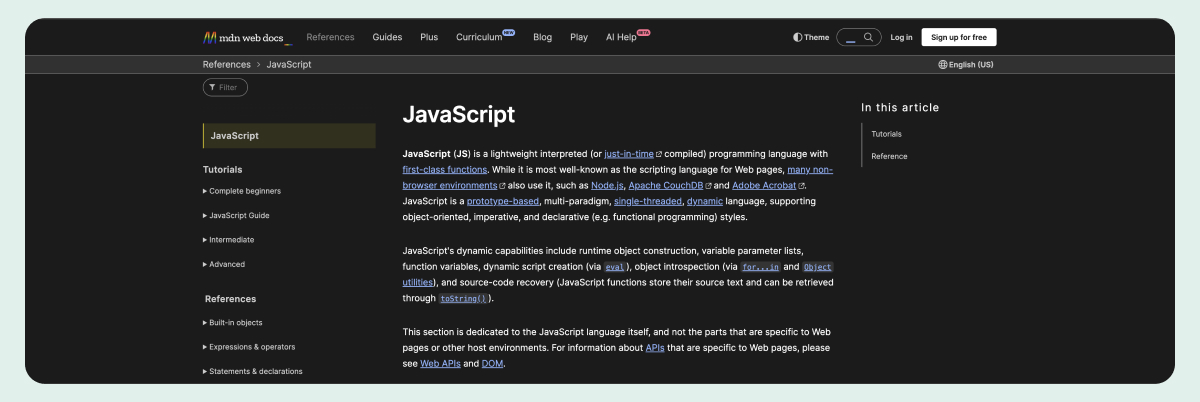
As the language of the web, JavaScript is an excellent choice for those interested in front-end development. Its ubiquity in web browsers makes it a crucial skill for any aspiring web developer.
Key features:
- Essential for interactive web development.
- Can be used for both front-end and back-end (Node.js) development.
- Vast ecosystem of libraries and frameworks (React, Vue, Angular, etc.).
- Relatively easy to learn, with immediate visual feedback in the browser.
Ideal for: Web development, both client-side and server-side programming, and creating interactive user interfaces.
3. Java
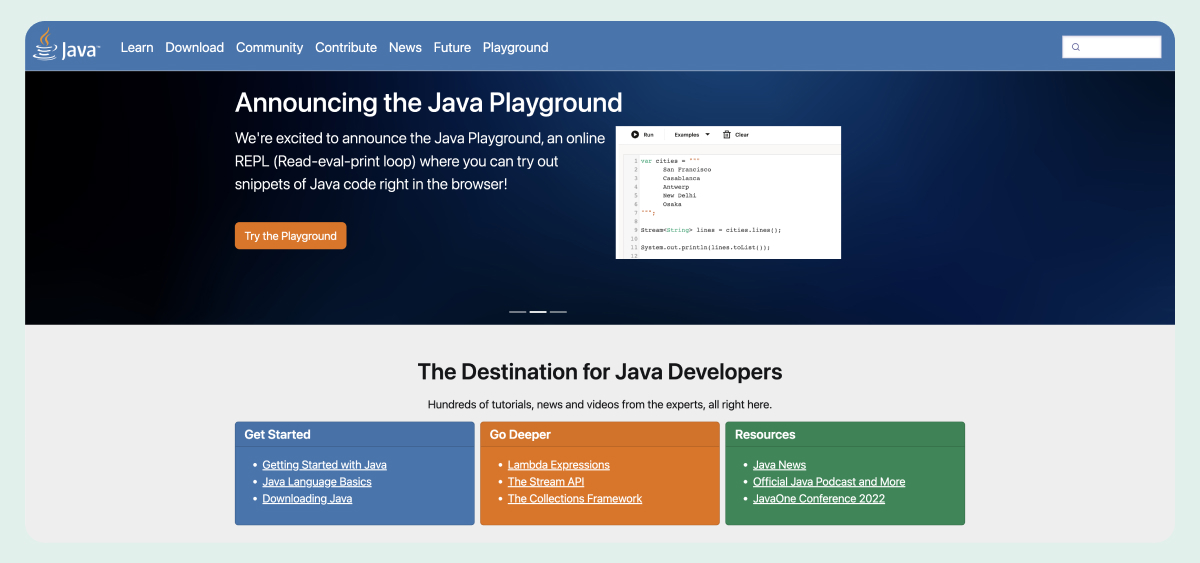
Despite being more complex than Python or JavaScript, Java remains a popular choice for beginners due to its widespread use in enterprise environments and Android development.
Key features:
- Object-oriented language.
- "Write once, run anywhere" philosophy.
- Extensive documentation and a large community.
- Strong typing helps catch errors early.
Ideal for: Android app development, enterprise software, and large-scale applications.
4. C#
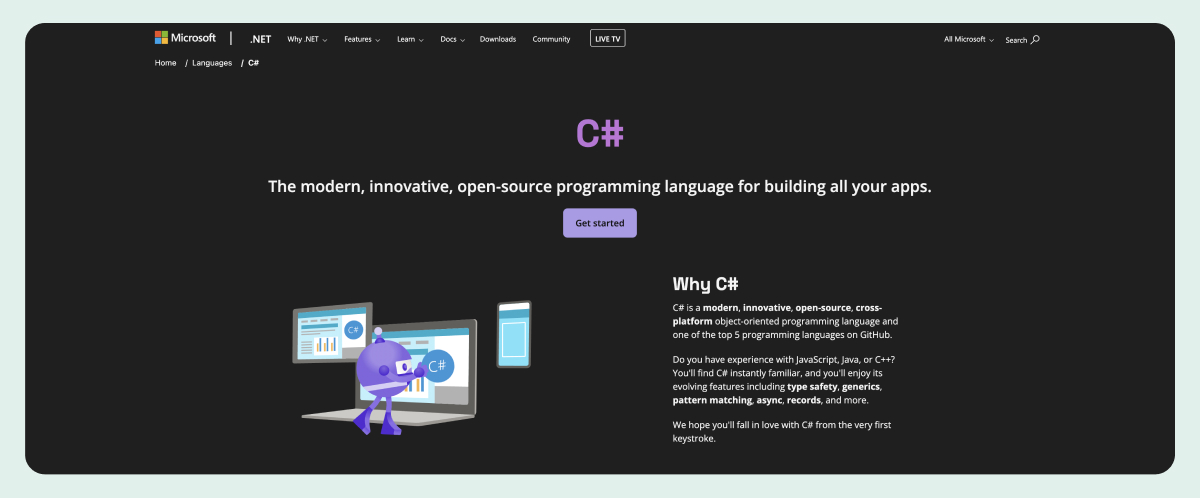
Developed by Microsoft, C# (pronounced "C-sharp") is a versatile language that's particularly strong in Windows application development and game design using the Unity engine.
Key features:
- Similar syntax to Java makes learning easier if you're familiar with C-style languages.
- Integral to the .NET framework.
- Excellent for Windows desktop applications and game development.
- Strong typing and object-oriented principles.
Ideal for: Windows application development, game development with Unity, and enterprise software.
5. Ruby

Known for its elegant syntax and developer-friendly features, Ruby is often praised for its readability and expressiveness. It's particularly popular in web development thanks to the Ruby on Rails framework.
Key features:
- Emphasizes simplicity and productivity.
- Expressive syntax that reads almost like natural language.
- Strong focus on object-oriented programming.
- Vibrant community and ecosystem, especially in web development.
Ideal for: Web development (particularly with Ruby on Rails), scripting, and prototyping.
Specialized programming languages to learn for beginners
While general-purpose programming languages like Python and JavaScript are versatile, certain fields in software development benefit from specialized languages tailored to their unique requirements.
Web development
Web development remains one of the most popular and accessible fields for new programmers. It typically involves a combination of back-end and front-end web development technologies used to design and create a professional web page.
Front-end web development:
- HTML: The backbone of web content, Hypertext Markup Language (HTML) structures the content of web pages.
- PHP: Despite being older, PHP still powers a significant portion of the web, including platforms like WordPress.
- CSS: Cascading Style Sheets control the visual presentation of HTML elements, handling layout, design, and responsiveness.
Back-end web development:
- Python (with Django or Flask): Offers a clean, readable syntax and powerful web frameworks.
- JavaScript: As mentioned earlier, JavaScript brings interactivity to web pages and is crucial for modern web applications.
- Node.js: Allows using JavaScript on the server-side, enabling full-stack JavaScript development.
Mobile app development
With the proliferation of smartphones, mobile app development has become a lucrative field with its own specialized languages. Here’s an overview of the most popular languages for app development based on the platform you want to develop for:
For iOS:
- Swift: Apple's modern language for iOS development, known for its safety features and expressive syntax.
- Objective-C: While being phased out in favor of Swift, it's still used in many existing iOS applications.
For Android:
- Kotlin: The officially preferred language for Android development, offering modern features and interoperability with Java.
- Java: Still widely used for Android development, with a vast ecosystem of libraries and resources.
Cross-platform:
Dart (with Flutter): Gaining popularity for its ability to create high-performance apps for both iOS and Android.
JavaScript (with React Native or Ionic): Allows web developers to use familiar tools to transition into mobile app development.
Data science and machine learning
The fields of data science and machine learning have exploded in recent years, with specialized languages rising to meet the demand. Here are the programming languages currently dominating these industries:
- Python: The de facto standard in data science, thanks to libraries like NumPy, Pandas, and scikit-learn.
- R: Particularly strong in statistical computing and graphics, popular in academic and research settings.
- Julia: A newer language designed for high-performance numerical and scientific computing.
- SQL: While not exclusively for data science, SQL is crucial for working with relational databases.
Game development
Instead of complex logic or efficient delivery of data, game development requires languages that can handle complex graphics and physics simulations. Right now, game developers mostly use:
- C++: Offers high performance and low-level control, crucial for AAA game development.
- C#: Widely used with the Unity game engine, popular for indie and mobile game development.
- Lua: Often used as a scripting language within game engines due to its simplicity and efficiency.
- JavaScript: Increasingly popular for browser-based and casual games.
How to compare programming languages to learn
When choosing a programming language, it's crucial to understand the key features that distinguish one language from another. These characteristics can significantly impact your learning experience, productivity, and the types of projects you can tackle.
Here are a few of the most critical aspects to consider when comparing languages:
Syntax and readability: The syntax of a language refers to its rules and structure. Readability, on the other hand, is how easily humans can understand the code.
Typing system: Languages can be statically typed (types are checked at compile-time) or dynamically typed (types are checked at runtime).
Paradigm support: Programming paradigms are ways of organizing code and approaching problem-solving.
Ecosystem and libraries: A language's ecosystem includes its standard library, third-party packages, frameworks, and development tools.
Community and support: Strong communities can provide resources, answer questions, and contribute to a language's growth.
Strategies and resources for learning a new programming language
Once you choose a programming language, you need to figure out how to learn it. Fortunately, there are tons of resources available to fit any learning style. You can take structured courses or learn at your own pace. No matter how you learn best or what your schedule restraints are, you can learn a new programming language.
Resources
Modern resources you can use to learn your first programming language include:
Online courses and platforms
Online learning platforms offer structured curricula and the flexibility to learn at your own pace. Choose a platform that aligns with your learning style. Some offer more video content, while others focus on interactive coding exercises.
Coding bootcamps
Bootcamps provide intensive, focused training over a short period, often with the goal of preparing you for a career in tech. Before committing to a bootcamp, make sure to do your due diligence. They range in quality widely so look at factors like job placement rates, curriculum, and reviews.
Books and documentation
Books and official documentation are invaluable resources for those who prefer self-paced learning or want to delve deep into a language's intricacies. To reinforce concepts, combine book learning with practical coding.
Practice projects and coding challenges
Applying your knowledge through projects is crucial for cementing your understanding and building a portfolio. Start with small projects and gradually increase complexity as you gain confidence.
Interactive coding environments
These platforms allow you to write and run code directly in your browser, making it easy to experiment and learn. Use these environments for quick experiments and to share code snippets when seeking help.
Strategies
When learning a new programming language, keep these best practices in mind to maximize the value of your time:
Consistency is key
Regular practice, even if it's just for 30 minutes a day, is more effective than irregular, lengthy sessions. Build projects, apply your learning to real-world projects to solidify your understanding, and build a portfolio.
Embrace the struggle
Programming can be challenging. View errors and bugs as learning opportunities rather than failures.
Teach others
Explaining concepts to others can deepen your own understanding.
Stay current and network
Follow blogs, podcasts, and news sites related to your chosen language and programming in general. Attend tech meetups and conferences, or join online communities to connect with other developers.
Take breaks
Regular breaks can help prevent burnout and improve information retention.
Recap
While we can’t tell you the perfect programming language to learn, we can equip you with the information you need to make an informed decision. Don’t stress too much, though. Once you learn one language, that base of knowledge makes learning related languages easier.
Regardless of which language you choose, you can start making money coding once you master any language on this list.
